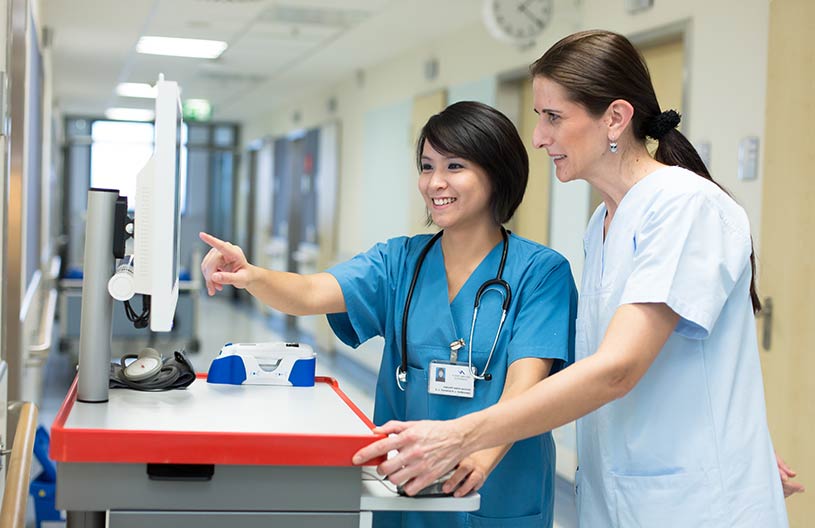Course Details
- Category: Nursing Adaptation & German Language
- Mode: Regular/ Hybrid
- Start date: Spring & Fall
- Application Deadline: Admissions are open
Eligibility Criteria
Any graduates with Nursing Diploma ( Bachelor of Nursing/General Nursing/Midwifery, etc) . The entry qualification documents are accepted in the following languages: English / Croatian.
Accepted proof of proficiency: FCE, CAE or CPE, IELTS or TOEFL
If your previous studies have been fully in English and it is marked on your certificate or transcript, or noted in a confirmation from the school which confirms that your studies have been fully in English language, additional English certificate is not required.
Any graduates or professionals with official legalised Bachelor’s and Master’s diplomas in Nursing, Health Sciences, Life Sciences or a higher education degree equivalents and academic transcripts who plan to pursue their studies or career healthcare sector. A final diploma ideally in a subject related to health or social care is highly recommended. If you don’t have a degree or international equivalent in a related subject, equiva
Program Structure
The 1 Year German Adaptation Program for Nurses is an integrated collection of study modules and services intended to develop foreign nurses' core academic, technical and employability skills; provide them with continuous education, training; and place them in high-demand, high-opportunity jobs. This multi-professional programme of study is intended for practitioners who are already working at a high level in their area of specialisation as well as those who want to improve their training, proficiency, and practise. In order to work at an advanced clinical level, exercise autonomy, make decisions in circumstances that are complex, uncertain, and involve varying degrees of risk, and accept responsibility for their actions, candidates will receive from the programme the language skills, professional behaviours (values and attitudes), and knowledge about language that are necessary.
This course is designed for candidates who already hold a nursing diploma that is in good standing or who have the necessary credentials to work in the nursing or healthcare industries. As a result, the course will close this knowledge gap and give participants the foundational German skills they need to succeed in any healthcare profession. This course will improve student knowledge of and understanding of multidisciplinary work in health and social care settings. It aims to provide an overview of quality management (QM) ideas and how they apply to health and social care services.
The course connects the workplace and the classroom through carefully supervised work placements in the healthcare sector. In addition to learning new material, students will also develop and hone employability skills.
Core Study Units : German & Expert Modules
The programme is an integrated collection of study modules and services designed to help candidates develop their fundamental academic, technical, and employability skills. It also gives them access to ongoing education and training while placing them in high-demand positions with plenty of opportunity. Every course in the curriculum is intended to help students get ready for the next stage of their education and careers while also giving them a credential that is valuable on the job market.

Know
The Course HighLight
The course will give the learners a space to be able to put their knowledge, skills and competence acquired to practice through work-based learning.
Apply NowLearn German
Classes according to Common European Framework of Reference for Languages CEFR :
For Nursing Graduates/ Professionals : A1 +A2 + B1 + B2 – 700 hours of German Teaching
A1 (Lower Beginner)
You ought to be able to comprehend basic German sentences at the A1 level as well as identify fundamental words that apply to both you and the environment. You can introduce yourself and use standard greetings. You can also write something straightforward, like "filling out forms." You can understand fundamental German vocabulary in slow speech
A2 (Upper Beginner)
At the A2 level, you can relate information about your job, family, and necessities. You can comprehend useful information like train schedules. You can also understand brief spoken and written messages.
B1 (Lower Intermediate)
At the B1 level, you can begin to consume more German media and understand the main points of radio or TV shows with slow, clear narration. You also develop more refined verbal and written expressions that will help you in preparations for the job market.
B2 (Upper Intermediate)
By achieving the B2 level, you can more fully appreciate German media, though you might still have trouble following fast dialogue or understanding idiomatic expressions. At this level, your use of German is more subtle. You are much less hesitant than you were at lower levels and can speak with the proper grammar, expressions, and words with greater ease.
Expert Modules
- Basics of gerontology, anatomy and physiology
- Care of the elderly and infirm
- Communication skills
- Safety at work and first aid
- Practical classes
German language certifications
Each language level will be finished with a language certificate examination. The CEFR levels are used to evaluate your German language proficiency. For students in various contexts, each of these exams offers an official evaluation of German proficiency. Generally, these exams are taken at authorized test centers on designated dates.
- Goethe-Zertifikat : There are six types of Goethe-Zertifikat, each corresponding to a CEFR level from A1 through C2. These are administered by the Goethe-Institut, an independent organization dedicated to the study of German language and culture. The test can be taken by any German learner over the age of sixteen. It works best for people who would like to teach, do research, or study in Germany.
- TestDaF: the Test Deutsch als Fremdsprache (Test of German as a foreign language) was created primarily for students who wish to study at the university level in Germany. Once you’ve passed the TestDaF exam, your certification will be valid indefinitely.
- telc (The European Language Certificates): The many varieties of telc language certification tests offer a practical evaluation of your German language proficiency and are an affordable alternative to the various Goethe-Zertifikat types.
- DTZ: BAMF, the Bundesamt für Migration und Flüchtlinge (Federal Office for Migration and Refugees), Germany’s national migration authority developed the DTZ, or Deutsch-Test für Zuwanderer, to track immigrants' progress in various government Integrationskurse (integration courses) (German test for immigrants)
- DSD : The Deutsches Sprachdiplom der Kultusministerkonferenz (German Language Certificate of the Education Ministers Conference), or DSD, was designed for foreign students who wish to study in German universities.
| CERTIFICATE NAME | WHO’S IT FOR? | CEFR LEVEL(S) |
|---|---|---|
| GOETHE-ZERTIFIKAT | Students (youth & adults) Visa-seekers Workers in fields like hospitality and childcare Teachers & researchers (C2 level) |
A1 – C2 |
| GOETHE-TEST PRO | Professionals & business people |
A1 – C2 |
| GOETHE-TEST PRO PFLEGE | Nursing professionals |
B2 |
| TESTDAF | University & graduate-level students |
B2 – C1 |
| TELC (VARIOUS TESTS) | Scientists |
A1 – C2 |
| DTZ | Immigrants |
A2 – B1 |
| DSD | Students (university level) |
A2/B1 (DSD I) or B2/C1 (DSD II) |
Learning Outcomes
On completion of this unit the student will be able to:
1. Develop an understanding of the theory and multidisciplinary perspectives in gerontology, anatomy, physiology and others.
2. Analyse research and policies on gerontological issues.
3. Demonstrate critical awareness of best practices and interventions that facilitate positive aging.
4. Reflect on global experiences of elder persons and apply to a local context.
5. Describe the signs and symptoms of commonly experienced mental health problems.
6. Describe the process of engaging with people who experience distress.
7. Develop knowledge of relevant infection prevention and control legislation
And more…
Benefits
Learners will learn how to:
1.Describe the fundamental abilities needed for a caretaker to succeed in their line of work.
2.Recall the significance of inclusive health and social care practices.
3.Determine the necessity of encouraging patient independence.
4.Define the significance of effective resource management in the health and social care sectors.
5.List and critically analyse the various health issues that arise frequently when taking care of the elderly.
6.Define the role of efficient communication techniques in elder care.
7.Make a point about how crucial it is to follow health and safety procedures when taking care of the elderly.
The course will give the learners a space to be able to put their knowledge, skills and competence acquired to practice through work-based learning.
Why do you persist in waiting?
Become a key worker yourself in the rapidly evolving care industry today to improve people's lives. This course can be taken by learners seeking employment in the care industry who wish to gain & demonstrate an understanding of the key principles of care. It is a robust introduction to the care industry and will be recognized by healthcare employers across European Union.
